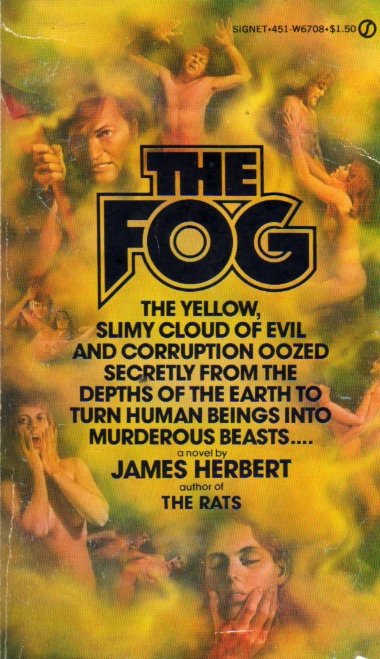
An earthquake rocks the British isles, demolishing a small village in Wiltshire, and releasing a bizarre yellow miasma that turns everyone and every thing it encounters homicidal, suicidal, or both. One of its victims is John Holman, an intelligence operative for the Minister of the Environment. Holman has been sent by his superiors to Salisbury Plain to poke around a restricted area owned by the Ministry of Defense and ensure they aren't befouling the countryside with any military jiggery-pokery.
As the only known survivor of direct exposure to the titular fog, which behaves like no cloud of water vapor meteorologists have ever seen, Holman is tasked by the British government to corral and eliminate the cloud before it reaches London and plunges the entire country into madness and depravity. In order to do that, Holman must first figure out what the fog is, where it came from, and if people in his own government were responsible for its creation. Even then, the measures required to stop the fog could be just as catastrophic as allowing it to roam freely across the nation.
The Fog was the second novel written by James Herbert, and it's every bit as anarchistic and punk rock as his first novel, The Rats. Today, we'd describe Herbert's early fiction as "Splatterpunk", because it positively revels in its straightforward depictions of depravity and violence. This is a book where a herd of cows curbstomb their farmer, a pilot drives a fully-loaded passenger plane into the GPO Tower just to kill the guy his ex-girlfriend is shagging, and a flock of pigeons re-enact one of the many scenes in The Birds.
In 1975 though, that term hadn't been invented yet, so The Fog gets labeled as "horror", and that's that. Grady Hendrix, writing for Tor in 2014, explained of Herbert's first two books:
Stephen King says they have a “raw urgency” and if by “raw” you mean, “totally flayed of skin” and if by “urgency” you mean, “gripping you by the collar and screaming in your face” then yes. In his non-fiction history of horror, Danse Macabre, King writes “If The Rats, with its scenes of gruesome horror and its blasted East End landscape, is not a literary version of ‘Anarchy in the UK,’ what is?” But the Sex Pistols are too consciously commercial for that comparison to ring true. Herbert is pub rock, the pre-punk, primal pushback against glam rock that was all hairy knuckles, screamed lyrics, two-chord thrashers, and no-future thinking.
What makes Herbert's books so entertaining is his fast-paced style combined with his inability to give fucks of any kind. Disaster films invariably have that scene where the main characters suddenly comprehend what it is they're facing, and we watch the dawning horror as someone says, "My god, imagine if this makes it to the big city!". Then everybody redoubles their efforts to solve the problem, some noble sacrifices are made, but the disaster is mitigated just in time. Herbert's stories fly in the face of this convention: the book runs for 275 pages, but by page 187 it has made its way into London, and everybody's day gets exponentially worse.
In The Rats, the problem facing the protagonist is at least a living natural threat. You can kill rats any number of ways, you just have to slaughter an awful lot of them to solve the problem. The same does not apply to a natural phenomenon like a fog. You can't poison fog to death, or shoot it with bullets, or hit it with an ax, or drop bombs on it, or run it over with a car. Unless you're operating in a hermetically-sealed vault, it can get in through even the tiniest crack. This makes it an exponentially more interesting and difficult problem to solve, which is why I had so much fun with this book.
The Fog isn't just Splatterpunk, it's rubbernecking porn. Side characters are introduced and obliterated in excruciating detail, and Herbert doesn't care if the ones doing the obliterating are a classroom of school boys, some house cats, or a cluster of Hare Krishnas. We watch because you can't turn away from the horrors, and unlike the guy slowing down to take a close look at the accident or doom-scrolling Russian dashcam videos, nobody actually got hurt so it's a guiltless pleasure.
James Herbert was loud, uncouth, and savage on a level that is still frankly quite impressive almost fifty years later. I have no qualms recommending The Fog to anyone who enjoys disaster flicks, and who doesn't mind guttural sex and violence mingled into the narrative. If this sounds like your cup of tea, then you're exactly who Herbert was writing for.
If it doesn't? Well, I understand Danielle Steele is still cranking out books these days....
Congratulations @modernzorker! You have completed the following achievement on the Hive blockchain and have been rewarded with new badge(s) :
Your next target is to reach 79000 upvotes.
You can view your badges on your board and compare yourself to others in the Ranking
If you no longer want to receive notifications, reply to this comment with the word
STOPTo support your work, I also upvoted your post!
Check out the last post from @hivebuzz: